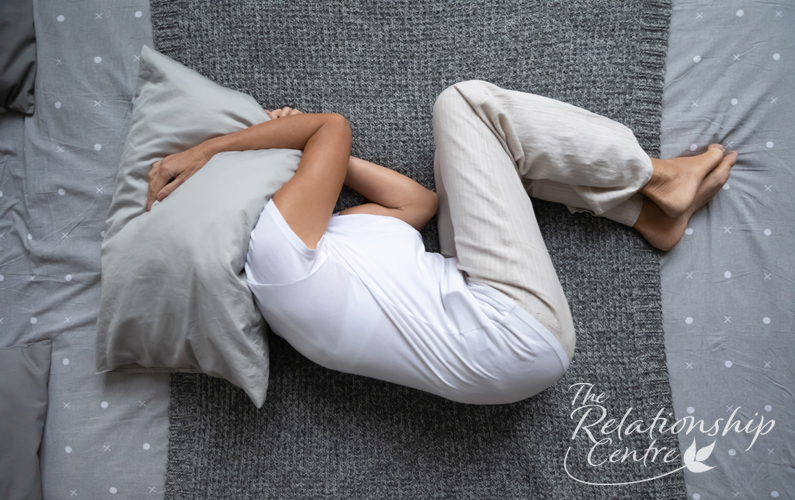Nighttime anxiety may seem like a mystery. Why does everything start to feel worse at night? And why can’t I shut my brain off?
In reality, nighttime anxiety is very common and there are often concrete causes behind it. In fact, the same reasons people are anxious during the day are the same reasons that cause nighttime anxiety.
But what does that mean?
What Causes Anxiety at Night?
Many things can cause nighttime anxiety.
Most commonly it is:
- Health concerns
- Work-related stress
- Caffeine consumption
- PTSD
- Hormonal imbalances
- Chronic sleep troubles
- Societal pressure
- Relationship struggles
- Problems experienced during the day
Another reason anxiety may be more noticeable at night is there are fewer distractions. Nighttime is when things slow down. The workday is over, the kids are in bed, and your brain finally has time to think about things. Sometimes, this is not a good thing as your brain can become focused on anxious thoughts that can feel like they spin out of control.
Frequent sleep disturbances including nightmares or insomnia may make you dread nighttime. If you can’t sleep peacefully and aren’t getting adequate rest, your brain will learn to view nighttime as a source of stress rather than the relaxation and rejuvenation is it supposed to be.
Finally, body aches often catch up with people at night. This exacerbates any existing health anxiety and can make it difficult to find restful sleep.
These sources and more are what lead to nighttime rumination, physical pain, panic attacks, racing thoughts, and other unsettling experiences that interfere with sleep. The good news is, you can do something about it.
How to Minimize Nighttime Anxiety
Depending on the cause of your nighttime anxiety, there are steps you can take to minimize your nighttime anxiety.
- Be mindful of your caffeine intake. Sure, many of us love to start our day with a cup of coffee. You don’t have to give it up, but be mindful of how much caffeine you’re consuming and when. Consuming it too late in the day may lead to anxiety at night. Remember that caffeine is also found in chocolate, energy drinks, soda and tea.
- Alternative sleeping problems. Interestingly enough, there may be other physiological sleep issues impacting your anxiety and your sleep. You may suffer from restless leg syndrome, which tends to act up at night. Or perhaps sleep apnea may be causing nighttime anxiety. If you know or suspect you have sleep apnea or other physical health conditions, speak to your doctor about being tested and if appropriate, treated for it.
- Try meditation. Meditation and other relaxation techniques can help relax your mind for a more restful night. Perhaps you do a gentle yoga routine, practice box breathing, or do a guided meditation. These exercises help you check in with yourself. Practice recognizing your anxiety without judgement so you can begin to let it go for the night.
- Medication may help. For some, medication may be necessary. Although you probably shouldn’t jump straight to sleep aids, they can be useful if other methods are not working for you. Talk to your doctor about what medications or supplements are best for you to try.
- Manage your stress. For most people, managing stress means setting realistic expectations and asking for help when needed. Too many people try to do everything on their own, often to their own detriment. Being realistic about what you can accomplish each day (at work and at home) is important to avoid becoming overwhelmed. And when there is too much on your plate, it is okay to ask for help and simply state you won’t be able to get that accomplished today. Actively working to better manage your stress will help to reduce feeling overwhelmed at the end of the day.
- Watch what you eat. Sometimes food plays a role in nighttime anxiety. Try logging a food diary for a few weeks and be sure to note your nighttime anxiety levels every day. You may notice that certain foods, or food consumed at a certain time, are connected to nights where you feel more anxious.
- See a therapist. As mentioned above, don’t be afraid to ask for help. This also includes seeking professional help. If your nighttime anxiety persists or you’re suffering from PTSD or relationship issues, seeing a professional is important. This will allow you to talk it out and create important skills to help you manage your nighttime anxiety.
Nighttime anxiety is no fun. It leads you to feel less rested in the morning, which affects your entire day. No matter the cause of your nighttime anxiety, there are ways to overcome it. Use these tips to take control of your routine and achieve a more restful night.










